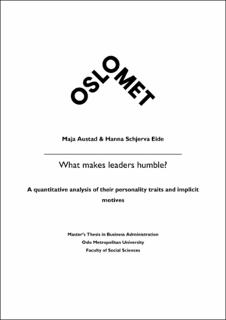What makes leaders humble? A quantitative analysis of their personality traits and implicit motives
Master thesis
Submitted version
Permanent lenke
https://hdl.handle.net/11250/3097935Utgivelsesdato
2023Metadata
Vis full innførselSamlinger
Sammendrag
This thesis explores what makes a leader humble. Building on theory on personality traits,
implicit motives and moral leadership we conducted a quantitative, cross-sectional study to
examine various factors that contribute to humility in leaders. The data collection was twofold:
leaders were asked to complete the HEXACO 60-item personality test, while their followers
evaluated their leadership style. Subsequently, the Motive-Self Categorization test was
administered to both leaders and followers, examining their implicit motives.
The main findings of the study (N=131) revealed a positive correlation between Extraversion
and humble leadership, aligning with prior research. This was the only trait that significantly
predicted humble leadership. Leaders with above-average power motivation and
Agreeableness were found to exhibit an increased level of humble leadership, where
agreeableness function as a moderator. Contrary to previous studies, no correlation between
Honesty-Humility and humble leadership was found. Our study highlighted a notable variation
in humble leadership across countries, with Norwegian leaders displaying a higher degree of
humble leadership.
These findings suggest that humble leadership might be a largely learnable skill, indicating the
potential for organizations to develop more effective leader training programs focusing on
ethical leadership. Our study adds new insight to the antecedents of humble leadership.
Further research is recommended to gain a deeper understanding of the relationships
between implicit motives and humble leadership. The thesis holds implications for
organizations aiming to foster humble leaders, as well as for policymakers and regulators
striving to create environments that encourage humility.
